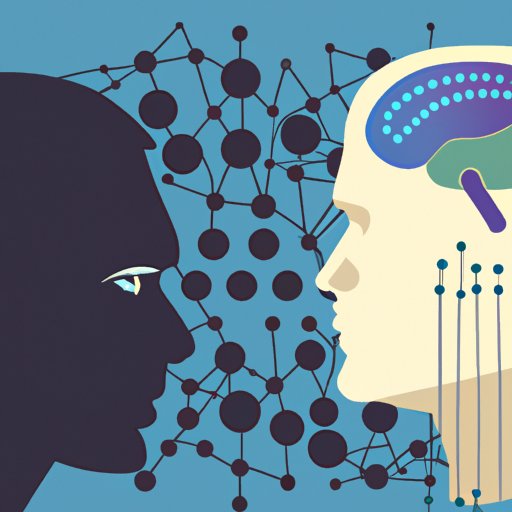Introduction
Artificial intelligence (AI) is rapidly changing the way we think about psychological research and clinical practice. AI is a broad term that refers to computer systems that are designed to simulate intelligent behavior. AI has been used in various fields, such as healthcare and finance, for decades, but only recently have researchers begun to explore its potential applications in psychology.
In this article, we will explore the current state of AI in psychology, including its potential benefits and risks, applications in research and clinical practice, and ethical considerations. Additionally, we will discuss possible future directions in AI-driven mental health interventions.

Overview of AI in Psychology
AI technology has the potential to revolutionize psychological research and clinical practice. AI can be used to automate tedious tasks, such as data analysis and interpretation, which can free up researchers and clinicians to focus on more complex problems. AI can also help researchers make sense of large volumes of data, identify patterns, and draw conclusions that would otherwise be impossible.
AI can also be used to develop personalized treatments for individuals based on their unique characteristics. For example, AI can be used to analyze an individual’s medical history, lifestyle, and other factors to determine the best course of treatment for them. AI can also be used to detect early signs of mental health conditions and provide more precise diagnoses.
Benefits and Risks of Using AI in Psychology
The use of AI in psychology offers numerous potential benefits. AI can be used to identify patterns and correlations in large datasets that may not be apparent to the human eye. This can help researchers gain insights into psychological processes and improve their understanding of mental health conditions. AI can also be used to develop personalized treatments for individuals, which can lead to better outcomes.
However, there are also potential risks associated with the use of AI in psychology. The use of AI requires access to large amounts of data, which raises privacy and security concerns. Additionally, AI algorithms can be prone to bias if they are not properly tested and validated. Finally, AI can be used to automate decisions that should be left to the discretion of experienced professionals.

Applications of AI in Psychological Research
AI has been used in a variety of psychological research projects. Natural language processing (NLP) is one application of AI that has been used to analyze text-based datasets, such as interviews and surveys. NLP can help researchers identify patterns in language and uncover underlying themes in psychological research.
Machine learning (ML) is another application of AI that has been used in psychological research. ML algorithms can be used to identify patterns in large datasets and make predictions about future behavior. For example, ML can be used to predict which individuals are most likely to respond to certain treatments.
Computer vision is another application of AI that has been used in psychological research. Computer vision algorithms can be used to analyze images and videos to identify facial expressions and body language. This can help researchers gain insights into nonverbal communication and gain a better understanding of psychological processes.
AI in Clinical Practice
AI has also been used in clinical practice to diagnose mental health conditions and develop personalized treatments. AI-based diagnostic tools can analyze patient data to identify early signs of mental health conditions and provide more accurate diagnoses. AI can also be used to develop personalized treatment plans that take into account an individual’s unique characteristics and needs.
AI-based virtual reality therapy is another application of AI in clinical practice. Virtual reality therapy uses immersive simulations to create realistic environments in which patients can practice coping skills and work through difficult emotions. This type of therapy has been shown to be effective in treating a variety of mental health conditions.
Ethical Considerations of AI in Psychology
The use of AI in psychology raises a number of ethical considerations. Privacy and data security are important issues when it comes to the use of AI. AI systems require access to large amounts of sensitive data, which must be protected to ensure patient confidentiality. It is also important to consider fairness and bias when using AI algorithms. Algorithms must be tested and validated to ensure that they are not biased against any particular group.
Finally, it is important to consider autonomy and responsibility when using AI in psychology. AI algorithms can be used to automate decisions that should be left to the discretion of experienced professionals. It is important to ensure that professionals retain control over the decision-making process to ensure that ethical standards are met.

Future Directions of AI in Psychology
AI has the potential to revolutionize psychological research and clinical practice. In the future, AI is likely to be used more widely in clinical practice, particularly in the diagnosis and treatment of mental health conditions. AI-driven psychological testing is another potential application of AI that could help researchers gain insights into individual behavior.
AI-driven mental health interventions are another promising area of research. AI-based virtual reality therapy is already being used to help patients work through difficult emotions and practice coping skills. In the future, AI-based interventions could be used to help individuals manage stress, anxiety, and other mental health conditions.
Conclusion
AI is rapidly changing the way we think about psychological research and clinical practice. AI can be used to automate tedious tasks, analyze large datasets, diagnose mental health conditions, and develop personalized treatments. While there are many potential benefits of using AI in psychology, there are also potential risks, such as privacy and security concerns, fairness and bias, and autonomy and responsibility. In the future, AI is likely to be used more widely in psychological research and clinical practice.
(Note: Is this article not meeting your expectations? Do you have knowledge or insights to share? Unlock new opportunities and expand your reach by joining our authors team. Click Registration to join us and share your expertise with our readers.)
